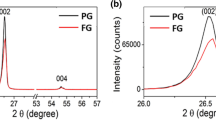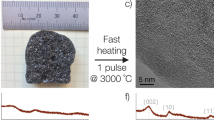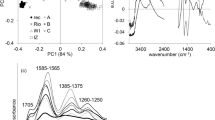Abstract
X-RAY examination1 indicates the presence of graphite in specimens of amorphous carbon. Y. Oshima and Y. Fukuda2 conclude that coke and charcoal consist of minute particles of graphite contaminated by and cemented together with hydrocarbon complexes. The so-called amorphous forms of carbon generally show a chemical activity much greater than that displayed by graphite. It is, therefore, of interest to report a reaction in which the reverse is the case. During some systematic investigations of the reactivity of various types of cokes it was discovered that graded (60–100 I.M.M. mesh sieves), hard, metallurgical coke is oxidised at 100° by excess of a mixture of chromic and phosphoric acids, much more rapidly than gas and low temperature cokes. Further investigation showed that graphite and highly graphitised forms of carbon are oxidised by this mixture approximately 20–25 times more rapidly than sugar charcoal.
This is a preview of subscription content, access via your institution
Access options
Subscribe to this journal
Receive 51 print issues and online access
$199.00 per year
only $3.90 per issue
Buy this article
- Purchase on Springer Link
- Instant access to full article PDF
Prices may be subject to local taxes which are calculated during checkout
Similar content being viewed by others
References
Debye and Scherrer, Phys. Z., 18, 291; 1917.
J. Fac. Eng. Tokyo Imp. Univ., 18, 125; 1929.
Author information
Authors and Affiliations
Rights and permissions
About this article
Cite this article
RILEY, H., BLAYDEN, H. Reactivity of Carbon. Nature 135, 397–398 (1935). https://doi.org/10.1038/135397c0
Issue Date:
DOI: https://doi.org/10.1038/135397c0
Comments
By submitting a comment you agree to abide by our Terms and Community Guidelines. If you find something abusive or that does not comply with our terms or guidelines please flag it as inappropriate.



